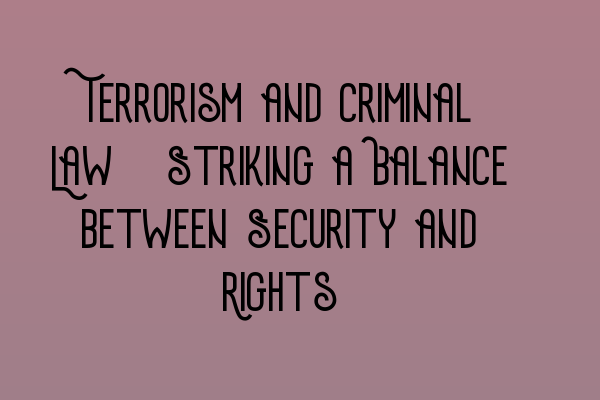Terrorism and Criminal Law: Striking a Balance between Security and Rights
The intersection of terrorism and criminal law presents a complex and delicate balance between ensuring public safety and upholding individual rights. As the world grapples with the constant threat of terrorism, it is crucial to examine how legal systems navigate this challenging landscape. In this article, we will explore the various considerations involved in striking the right balance between security and rights.
Defining Terrorism
Before delving into the legal aspects, it is important to understand the definition of terrorism. Terrorism can be broadly defined as the use of violence, intimidation, or coercion for political, religious, or ideological purposes. Acts of terrorism aim to create fear, disrupt societies, and challenge existing political structures.
The criminalization of terrorism is a global phenomenon, with countries implementing specific legislation to combat this threat. The UK, for instance, enacted the Terrorism Act 2000, which defines various terrorist offenses and provides law enforcement agencies with necessary powers to prevent, investigate, and prosecute such crimes.
Ensuring Security
In the face of terrorist activities, ensuring security is paramount. Governments have a duty to protect their citizens from harm and maintain public order. This requires robust legislation that equips law enforcement agencies and intelligence services with the necessary tools to counter terrorism effectively.
Legislative measures, such as surveillance powers, enhanced investigatory techniques, and intelligence sharing agreements, play a crucial role in preventing terrorist attacks. These measures provide the authorities with the means to gather intelligence, identify potential threats, and disrupt terrorist networks.
Moreover, countries must invest in counter-terrorism strategies, including the training of specialized units, analysis of threat intelligence, and international cooperation. By adopting a proactive approach, governments can mitigate the risk of terrorism and protect their citizens.
Protecting Individual Rights
While ensuring security is crucial, it must be balanced with the protection of individual rights and civil liberties. The rule of law forms the foundation of democratic societies, and any encroachment upon individuals’ rights undermines the principles of justice and fairness.
One of the key challenges lies in identifying the appropriate limits on state power. Governments must strike a balance between empowering law enforcement agencies to safeguard the public and preventing intrusive practices that infringe upon individual privacy.
Legal frameworks must incorporate safeguards, such as judicial oversight, to prevent abuses of power and ensure that security measures are proportionate, necessary, and lawful. This requires a delicate weighing of conflicting interests to strike the right balance between safeguarding national security and respecting civil liberties.
The Role of Legal Professionals
Legal professionals occupy a crucial role in navigating the complexities of terrorism and criminal law. Solicitors, barristers, and judges play instrumental roles in upholding the rule of law and ensuring that individuals are treated fairly and justly.
Lawyers specializing in criminal law and human rights contribute to the development and interpretation of legislation concerning terrorism. They provide legal advice and representation to both defendants and the prosecution, ensuring that cases involving terrorism are conducted in accordance with the law.
Their expertise helps to safeguard the rights of individuals, challenge unlawful practices, and uphold the principles of justice. By asserting the importance of fair trials, legal professionals contribute to the overall effectiveness and legitimacy of counter-terrorism measures.
Conclusion
The balance between security and rights in the context of terrorism and criminal law is a constant challenge for legal systems worldwide. While ensuring security is of paramount importance, it must be achieved without compromising fundamental rights and principles. Striking the right balance requires thoughtful legislation, effective enforcement, and the involvement of legal professionals dedicated to upholding justice.
Keep reading our related articles for more insights:
- SQE 1 Practice Exam Questions
- SQE 1 Practice Mocks FLK1 FLK2
- SQE 2 Preparation Courses
- SQE 1 Preparation Courses
- SRA SQE Exam Dates
